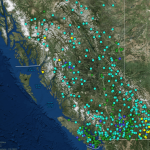New partnership to revolutionize freshwater monitoring
Living Lakes Canada partners to deliver a three-year project bringing environmental DNA technology to communities across Canada – see below for a recording of the live announcement.
GUELPH, Feb. 4, 2019 – The power of environmental DNA technology is being extended to community groups across the country to allow for faster creation of more robust freshwater health data, The University of Guelph recieved a $2.6 million grant from Genome Canada. They will be partnering with Living Lakes Canada, World Wildlife Fund Canada, Environment and Climate Change Canada (ECCC) to deliver this project.
“We are very excited to be testing this new DNA technology on the ground with and for community groups who have the most to gain in understanding stream health through the sequencing of DNA for biodiversity purposes. This technology will be a gamechanger and is very timely given the urgent need to understand the health of our respective watersheds in Canada,” said Living Lakes Canada executive director Kat Hartwig.
Environmental DNA (eDNA) metabarcoding is a combination of DNA identification and automated DNA sequencing to generate biodiversity data for freshwater benthic macroinvertebrates, the small animals that live at the bottom of streams and rivers. Changes in the make-up of these invertebrate communities can be excellent indicators of pollution and other environmental stressors.
Compared to current monitoring methods, which can be slow and costly, eDNA metabarcoding technology has the potential to produce biodiversity data more quickly, more affordably and at a higher resolution. The results of DNA-based biomonitoring will support better environmental assessment, planning and regulatory decisions – which is essential as population growth, agricultural activity, resource development and climate change all put increasing pressure on Canada’s freshwater ecosystems.
“Our Watershed Reports found a shocking data gap with respect to freshwater health, despite the heroic efforts of community groups, staff and volunteers dedicated to safeguarding this essential public resource. This commitment brings community-based monitoring into the 21st century. Considering the increasing stress caused by climate change and the cumulative effects of other human activities, not to mention major developments on the horizon, the timing couldn’t be more perfect,” said Elizabeth Hendriks, vice-president of freshwater conservation at WWF-Canada.
While many community groups already use biomonitoring to understand and manage the impacts of resource projects such as mines, hydro dams and energy projects, access to new genomics-based techniques for assessing watershed health will broaden the reach and impact of existing community-based monitoring programs, ultimately leading to better and faster data for informed decision-making.
“This project is a stepping stone in the application environmental DNA metabarcoding for large-scale assessment of watershed health. Our lab has pioneered the use of advanced DNA technologies for biodiversity analysis for over a decade and we are very pleased in joining forces WWF Canada, LLC and ECCC and various other stakeholders and citizen scientists in using this approach for our valuable watersheds,” said Academic Project Lead Mehrdad Hajibabaei, Associate Professor at the University of Guelph.
Funding for this project, called STREAM DNA (Sequencing the River for Environmental Assessment and Monitoring) is provided by Genome Canada, WWF-Canada and ECCC.
Click below to watch a recording of the live announcement (beginning at 19:46 and ending at 25:02).
About World Wildlife Fund Canada
WWF-Canada creates solutions to the environmental challenges that matter most. We work in places that are unique and ecologically important, so that nature, wildlife and people thrive together. Because we are all wildlife. For more information, visit wwf.ca.
About Living Lakes Canada
Living Lakes Canada bridges the gap between science and action to foster citizen-based water stewardship. Our mandate is to help people across the country understand the intimate connections between water quantity, water quality, land-use, climate change, biodiversity, and healthy human communities by building a water stewardship ethic that everyone can be proud of.
About Environment and Climate Change Canada
Environment and Climate Change Canada has a mandate for research, monitoring and enforcement related to freshwater in Canada. The Department maintains the Canadian Aquatic Biomonitoring Network, which is a multi-partner program to measure freshwater ecosystem health with standardized methods, database tools and training.





